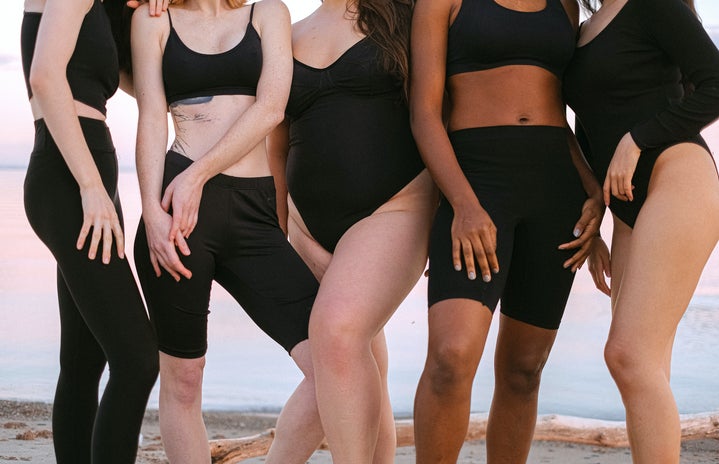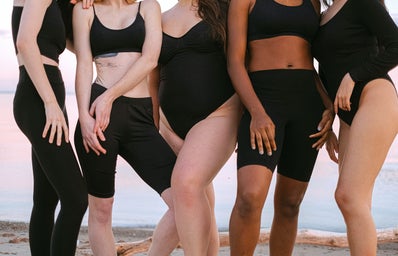In the 21st century with social media being at a constant dispense, I think it is always a hot topic to discuss body positivity and self-love. Being a cis-gendered woman, my body image and how I present myself is constantly under scrutiny because of how society is structured with creating unrealistic expectations for women and men. This is toxic, unhealthy and needs more open discussions so we can move towards a body inclusive environment that doesn’t damage how mental health and well-being. The main challenge of self-love and acceptance in terms of our body image is the longstanding diet culture that promotes eating disorders and body dysphoria. So yes, it is time to ditch it.
Social media and influencers:
I’m sure many of us are guilty of scrolling endlessly on social media, whether that’s TikTok or Instagram – I know I am. But have you ever sat and considered how this is affecting your self-image? Whether we follow these accounts or not, social media constantly portrays a stereotypical body type that is ethnocentric, slim and pretty much ‘flawless’ and this can cause damage. Fashion brands are guilty of editing their photos and only showing certain body types which are tall and slender, it is only within recent years that some brands have changed this narrative to be more body inclusive. A personal favourite of mine is Savage Fenty by Rihanna which caught global attention on the wide range of individuals of all different shapes and sizes that are used in the brand’s representation. This is something young people who are highly influenced need! Without us knowing, social media slowly but surely distorts our self-perception this is because with a click of a button I can delete my ‘flaws’ through apps or add filters that accentuate features of mine, but that’s not me and without having cosmetic surgery chances are I won’t ever look like that. However, I am fine with that because I have gotten to the point of loving myself in a healthy way, but the younger me didn’t and for many young people who have access to social media this can create long-lasting negative impacts. One big controversy is influencer culture, which is known for pushing these ideal types that are quite frankly unrealistic. For example, I’m sure by no doubt you are aware of the Kardashians and how amazing they look. Yes, they do look great, but this isn’t real just like most influencers you have engaged with, they probably have all had some sort of cosmetic surgery. Now I’m not here to shame women who have had work done or plan to because that’s their choice and it’s none of my business, but I’m here to remind you to not compare yourself to them.
eating disorders and body dysmorphia:
Eating disorders can present themselves in numerous ways such as binge eating, bulimia and anorexia, without getting correct professional health they can become life-threatening. Eating disorders can stem from many things but most commonly they are linked to body dysmorphia which is a mental health condition where an individual spends a lot of time worrying about their appearance or hyper fixate on a particular feature. Both men and women can be affected by eating disorders but research suggests that 90% of those with eating disorders are in fact female and those who are at most at risk of developing a disorder are teenagers and young adults. Eating disorders are a serious mental health condition but it is time to start making links between toxic diet culture and social media and how this is impacted young minds. To learn more about these disorders and where to gain help if you recognise any of the signs in yourself or someone close to you, I recommend reading Neave Glennon‘s article which portrays the reality of these disorders in a captivating manner.
Diet culture:
Never heard of diet culture? Let me elaborate on what is and why we need to leave it in 2021. Diet culture is a belief (a very pervasive one) that our appearance and body shape is more important than general well-being, therefore, controlling our body in terms of what we eat and don’t eat and how much of is normal – by the way, it’s not. This toxic culture can impact anyone and is very much fuelled by the capitalist society we live in, to the extent that it has been normalised labelling food as good or bad. This is shown particularly in dieting schemes such as Slimming world which allows you to have a certain number of ‘sin’ food a week, how messed up is that? Diet culture can push eating disorders because it neglects the crucial fact that food is fuel, it is a social and cultural thing part of our lives and pushing diets isolates us from enjoying it because we are made to believe that being thin makes you a better person. It is important to remember that thin doesn’t mean healthier, and if you’re depriving yourself of the nutrients your body needs it is equally as damaging. Diet culture to me seems to really circulate most in the lead up to summer where girls talk about having a glow up. Unfortunately, this ‘glow up’ seems to always involve losing weight in order to be more confident when you’re in enjoying beach trips with your friends, again this expectation can come from the thousands of images women are exposed to of slim bikini models with 0 imperfections. It’s time to love ourselves enough to realise we don’t need to lose weight or have a certain physique change to have a ‘glow up’ and we can simply glow all year round and finally ditch this diet culture.
Learning to love your body:
If you skimmed through this article or realised you identify with some of the things I have said, I want you to really focus on this last part about learning to love the body you have been blessed with. It can be hard to begin with fully embracing every inch of ourselves, every stretch mark, every skin blemish but it is time to change this with small steps. I encourage you to shop at brands that are body positive and inclusive which don’t edit ‘imperfections’ on their photos but hey guess what, there is no such thing as body imperfection. WE ARE NOT ROBOTS WE ARE HUMAN. Our body is designed to stretch and change continuously through our life and shopping with brands that embrace this can psychologically be good for your mental health because it shows you that any similarities you have are NORMAL! Surround yourself with people who make you feel better about yourself even if that means unfollowing certain accounts on social media in which you find yourself constantly comparing your image to them, trust me it will be better in the long run.
Don’t get me wrong, there is nothing wrong with wanting to lose a little bit of weight or participating in activities that will give you a ‘summer glow up’ BUT there are healthy ways to do this rather than committing to the diet cultures ideology. Equally, there is nothing wrong with getting cosmetic surgery or following the influencer lifestyle but just if it is making you happy and is something you want to do, not something you feel you must do in order to try and reach the unrealistic and constantly changing societal expectations placed on women. Just be authentically and unapologetically you.


